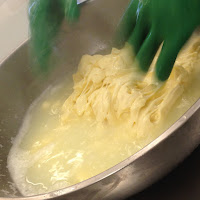Thank you for reading the infrequent Dreamfarm blog! The height of the summer pulls us in many directions and unfortunately all farm updates get put on the back burner. But here we are in September! We made it!
 Our calf, Juniper, is healthy and growing quickly. We are slowly weaning her off milk this week and she will only be eating grain and hay next week. In the coming weeks we hope to rejoin her with her mother, Nelle. Her companion these last handful of months has been Artemis, our young goat buck. He will join the lady goats (does) at the beginning of October. Together they make the cutest pair on the farm.
Our calf, Juniper, is healthy and growing quickly. We are slowly weaning her off milk this week and she will only be eating grain and hay next week. In the coming weeks we hope to rejoin her with her mother, Nelle. Her companion these last handful of months has been Artemis, our young goat buck. He will join the lady goats (does) at the beginning of October. Together they make the cutest pair on the farm.
Our cheesemaking has been very successful this season. With the help of our healthy animals and the beautiful summer weather, we have been able to produce enough cheese to supply not only our CSA members, but the Willy St. Co-ops, L’Etoile, Underground Meats, Oliver’s Public House, the Sow's Ear, and the Westside Community Farmers Market on Saturday mornings. The local community has been generous and we are honored to be a part of southern Wisconsin’s food movement.
We have specifically been working on perfecting our Mozzarella cheese. I think we have finally found a system that works. Our mozzarella begins with Nelle, our sweet Jersey cow who provides the wonderful milk. Diana then takes that milk and makes the mozzarella curd in preparation for it to be stretched the next day.
The following photos show a picture story of the stretching process.
We have specifically been working on perfecting our Mozzarella cheese. I think we have finally found a system that works. Our mozzarella begins with Nelle, our sweet Jersey cow who provides the wonderful milk. Diana then takes that milk and makes the mozzarella curd in preparation for it to be stretched the next day.
The following photos show a picture story of the stretching process.
 |
| Mozzarella curd Diana made the day before |
 |
| Cutting the curd in preparation for stretching |
 |
| The curd is cut into small squares and transfered to a bowl |
 |
| A mixture of whey, water and salt is heated to 180 degrees to be poured over the cut curd |
 |
| The hot water being poured over the curd |
 |
| The first batch of hot water sits on the curd for about a minute |
 |
| The water is drained off |
 |
| The curd has softened slightly. Another batch of hot water is poured over the curd. Now it is time to stretch! |
 |
| Once the second batch of water is poured the curd needs to be kneaded together and stretched |
 |
| Once the curd becomes smooth and uniform, a portion is pulled off |

 |
| Then the portion is folded in our hands to form a ball |
 |
| When the ball is smooth and uniform it is finished and placed into a tub of cool salt water. |
 |
| Then they are weighed, packaged and labeled, ready for sale at the market. |




